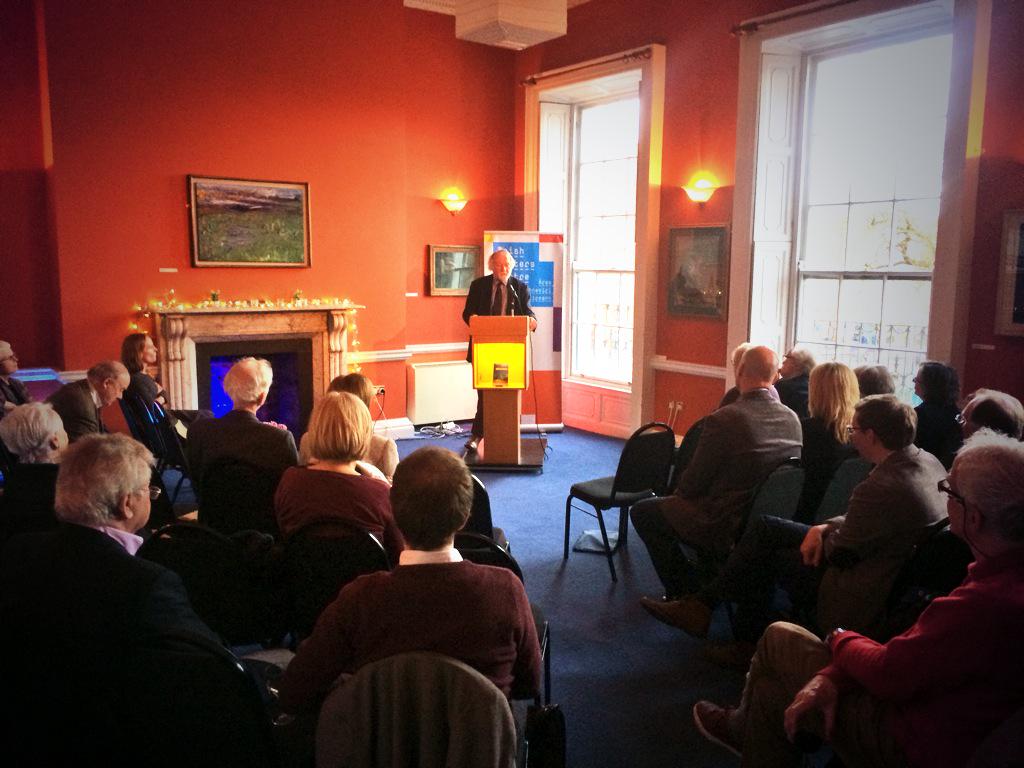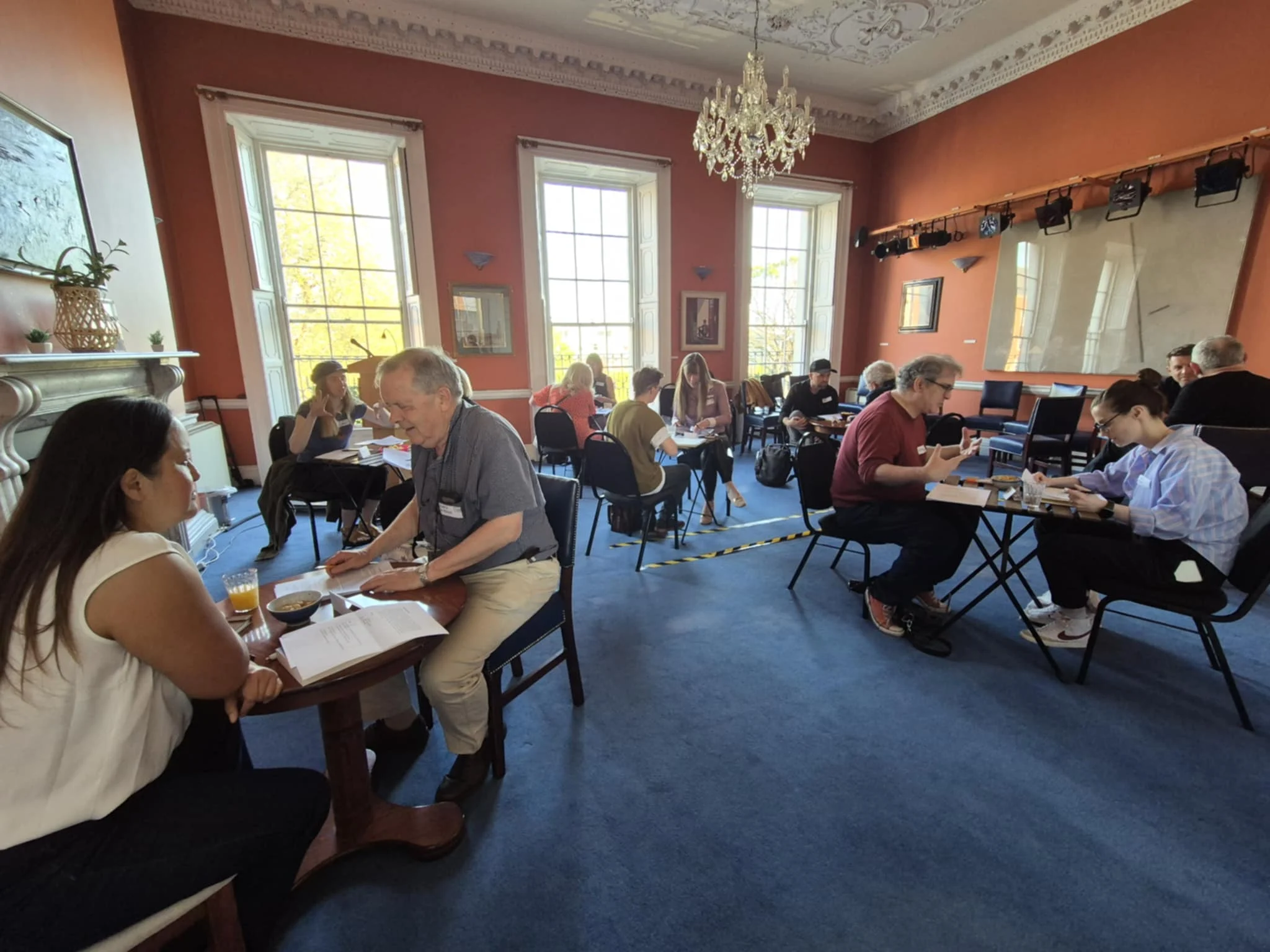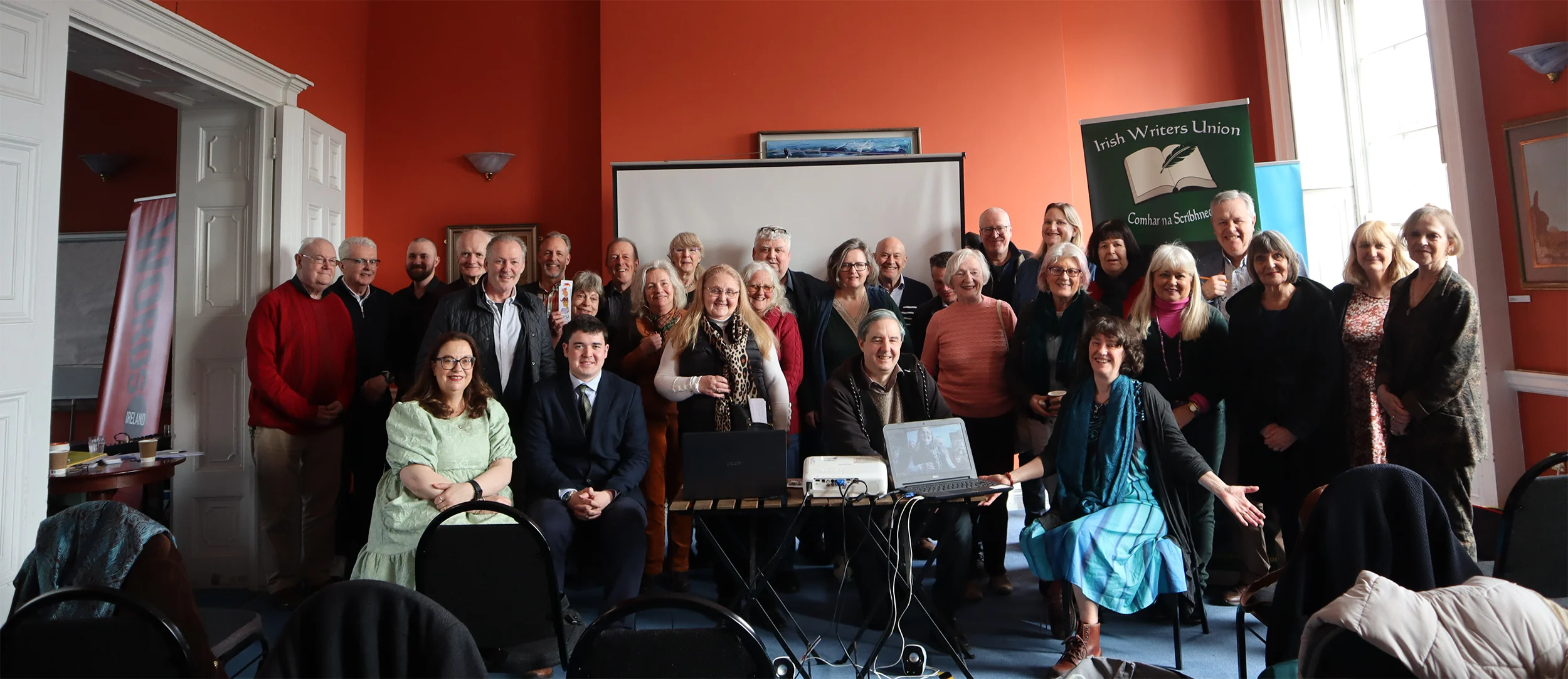
Every workshop is a community of craft
Evan Boland
In this article, Glenda Cimino analyses a writing workshop that really worked for her to help understand what makes for a successful writing workshop.
Over the years, I have taken quite a few writing workshops. I have also facilitated writing workshops myself on occasion. I think feedback and constructive criticism from other writers is always helpful, whether one to one or in a group setting. However, submitting small pieces of unconnected writing for discussion – a poem, a story, a memoir – didn’t seem to lead anywhere for me.
I don’t do many writing workshops these days. Years ago a writer told me after his workshop that I didn’t need any more workshops, I just needed to write and not let the fear of imperfection put me off achieving what I could. What I needed to learn was outside the workshops: self-discipline, self-belief, setting and keeping a writing schedule, avoiding distractions, stopping spreading myself too thin in many activities, focusing on one project at a time, stopping comparing myself negatively to others, keeping motivated, and above all valuing my work. That also meant allowing myself to be ‘selfish’: not being available to people who just wanted to chat to pass the time, or drop-ins when I was working and learning to say ‘no’ instead of ‘yes.’
A successful example of a Writing Workshop
During 2019, an email about workshops from a New York literary agent attracted me. There were workshops in Paris, Hawaii, Italy, and South Africa. The costs were far beyond the reach of my budget. However: there was one being offered for five days in Dublin. As I live here, I would not have to pay for accommodation or travel. And there was a 50% bursary one could apply for by sending a writing sample, and I applied and was offered a bursary. Nonetheless, this non-residential workshop still cost more than any residential workshop I had ever taken.
I have to say that it was worth it. It was worth it because for five whole days my priority was systematically approaching every aspect of my would-be novel. Over years I had written various parts of it, even lost whole chapters when a laptop shorted out; and I couldn’t even find printed versions in the boxes in my chaotic home office. This course was worth it because it truly motivated me – and I organised more and wrote more in those five days than I would have ever achieved without the course. I left feeling confident that others thought it was worth writing and that I could finish it. And it didn’t have to be perfect to be worthwhile.
There were about a dozen writers on the course. All but one were women of varying ages. Three of us were from Dublin. Everyone in the group had already been published, and the writing standard was very high. There was a screenwriter from Los Angeles, a novelist from the west coast of Scotland, a woman from Germany who had published two novels, a writer from Seattle, a children’s book writer, a nonfiction writer, a historical novelist from Genoa, a woman who worked as a counsellor to immigrants in Florida, a writer from Dallas who had been an attorney, a short story writer and former teacher from Dublin. The agent, who facilitated the group the whole time and was available for one to ones and socialising in the evenings, was also a published writer. Her assistant was doing an MA in Liverpool and writing ‘narrative non-fiction.’
While the participants were people who had already chalked up quite a few successes, and presumably could afford the high-priced course, flights and accommodation, I felt beginners as well as established writers could benefit from the approach.
One of the perks was a daily lunch of sandwiches and salads, tea, coffee and dessert, which was laid out before we began, so there was opportunity to socialise, introduce ourselves to each other informally and chat. Then we adjourned to a room in the venue with a big table where we would spend the week to come writing, reading, discussing our work intensely.
And every night after the course concluded, people had the option of going for drinks and/or dinner together, which many did. Some people came because they wanted to be in Dublin, while others would have gone anywhere this course was being given.
Diving Right in to Writing Exercises
The facilitator made it clear from the first day that this was not a place to bring your ‘old pages,’ even if it was a book we had already begun writing. We would be writing new pieces each day and it was okay to give ourselves permission to ‘write badly.’ We were embarking on an adventure of discovery, a journey into our own ideas. We would use our own writing each day to look at the ingredients of narrative, and our unconscious as well as our conscious processes. We would investigate our own creative focus and process, and “getting to the essence” of our particular work. And we would read our new writing to each other every day, so we could all learn from advice given to each of us.
We were to take something we perhaps had begun or wanted to write and work on that for the week. We introduced ourselves, said something about our writing goals and what we hoped to accomplish during the course. I chose a novel based on some real events which I had been writing bits and pieces of for years on and off without making significant progress.
On this first day we were reminded not to ‘pre-explain’ but to take the reader through the journey. We looked at the ‘narrative ingredients’ and wrote pieces from our work under the headings plot/action; characters in our story; dialogue; setting/place [place can also be a character]; theme; point of view/voice; active vs passive writing; present tense or past tense; temporal frame [how the story unfolds in time]; and who is the book being written for/who is the story being told to. Examples were given from other works. We were asked to consider, why do we care about this story, these characters? We wrote a ‘blurb’ for the back of the book, also, and read some of the above to each other. We were given helpful pointers and suggestions by the facilitator without any sense of being judged or compared.
And that was just the first day!
Workshopping on writing characters
The next day we began by looking at character in more depth. We noted that characters are revealed through their actions, what they do and what they say. Drama shows people at their extremes. Your main character, it was stated, must be in the midst of the battle of his or her life, or a test or challenge or crisis of faith.
We then had a guided meditation and launched into more writing exercises. Meditation is very useful for getting into a different rhythm, a deeper consciousness. We identified three settings where important events happen in our story and wrote about each. We identified our main character – and what was that character fighting for? What was the motivation and goal of that character? What is the most important turning point for that character in our story? We talked about making interesting rather than predictable choices. What does your character believe, and what happens when he/she follows or departs from those beliefs?
Then we wrote about five things that help the character discover the truth, and five things that hinder that character in his/her quest. And point of view: through whose eyes are we seeing the world of this character? We wrote a piece about the main character and a piece as the main character. Then we gave our character a physical activity we knew something about – I chose gymnastics – and wrote, noting if anything new about the character emerged through giving him/her this activity. I felt that much that I wrote was surprisingly really useful for understanding the character, this would-be book and why I wanted to write it. And I wouldn’t have written so much so quickly without the prompting of the workshop.
“Can you summarise the plot of your book in 10 points?”
We made a short ten-point plot outline. Some writers clearly found it difficult to tell their story in 10 points.
Next we were invited to make a bullet list of all the possible revelations of our book, play, or screenplay. ‘Where there is revelation, there is suspense,’ the facilitator said. And where there is suspense, people tend to keep reading.
We then looked at how these revelations fit into our plot..
My notes are also sprinkled with dozens of references to and quotes from other writers and how they dealt with these points – which I hope to follow up on someday. I was encouraged to write about the real events of my story ‘as if’ they were fiction.
We were also asked to identify any particular areas where we feel stuck.
Introduction to the business of publishing and ‘POV’
The facilitator explained the completely different approaches to selling fiction and nonfiction, and working with literary agents and publishers. We looked at sample book proposals, their role, and how to write one. We did another exercise, writing a ‘spellbinding’ query letter to a publisher. We explored what to expect from your literary agent and publisher, how advances and other contract issues work, and how books move from the page to the stage, or the big screen.
We returned then to writing work, to go deeper into the role of place and perspective, and the backdrop or context of our stories. What was the effect of viewing your story through a ‘closeup’ on something particular in the landscape, and/or via a ‘long shot’ from a mountaintop or a helicopter or other vantage point from above? What difference does POV [point of view] make if your story is narrated from ‘I/we,’ ‘he/she/they,’ ‘you’, or an omniscient viewpoint? Or several different viewpoints?
Themes, Belief Systems, and more workshop writing on Plot
The plot of your book or play is an attempt to illuminate a particular philosophical problem, belief, or snapshot of a world at a particular point in time. We explored underlying belief systems, our own and our characters, whether conscious or unconscious. Artfully understanding and using the thematic and historical elements of our work can result in a work of art that is deep and resonant rather than superficial and commercial -though the latter are very popular.
We discussed how place and setting in our stories revealed themes and belief systems. Then the facilitator talked about the business of publishing and producing in light of the current economy.
We went back to our 10 point plot outline again, and tried to link the revelations to each plot point or chapter. I found this exercise particularly useful. Of course, not everyone writes in this organised way – but it is good to have a map, even if your route changes as you go.
We were asked to try to identify our particular target audience, and given suggestions on how to leverage our talent in a way that gets the attention of the powers that be. After all, without writers and new books, it was noted, agents, publishers, and producers are out of business. Research what publishers publish, and who might be looking for a book like your book. If your book goes out of print, you can ask for the rights back.
Discovering your own authentic writing voice
On this final day, we reviewed what we had done since we started and focused on discovering our most colorful, personal, and authentic voice. “We’re in the habit of thinking, based on bland television and newspaper reporting, that a homogenized voice is the most objective and appropriate voice for conveying an unbiased story,” our facilitator said. That may work well for presenting a certain type of general information to the public, but that generic voice does not serve the richness and color and personal nature of authentic stories, stories that live and breathe what life is really like and the gamut of human experience.
Finally, we looked at the necessity for fiction and nonfiction authors alike to do their research to make their book as accurate as possible in its details. This also might involve consulting experts, as in details of crime forensics, or mining history, searching archives, doing interviews, visiting locations, and eye witness observation. It is also important to know if your work has ‘permissions’ concerns.
Conclusions from the writing workshop
I got a tremendous amount out of this course, not just from the facilitator but from the participants with their varied backgrounds and topics and their input into the discussions. I couldn’t believe all that it covered in a mere five days, or how much I was encouraged to write and did write. I have a whole notebook full of material now that will either inform or go straight into the draft of the novel, and I feel a new confidence that I should go for it. There was also a stress on learning to focus on the various aspects of the work. I am sure that my summary still doesn’t cover everything – for instance, I have just remembered a segment on naming characters! If I don’t get that novel written now, I will have no one to blame but myself, as I have had the best coaching and encouragement from the workshop. Somehow we were smoothly led to tackle every dimension that needed to be considered in a fiction or non-fiction work. I would love to go to another one of these workshops someday in another country. A few of the writers on the course had attended previous workshops with this facilitator elsewhere and had come back again. We keep in touch on What’s App and note each other’s publications as they appear.
Whether aspiring or established, writers are encouraged to join the Irish Writers Union.











